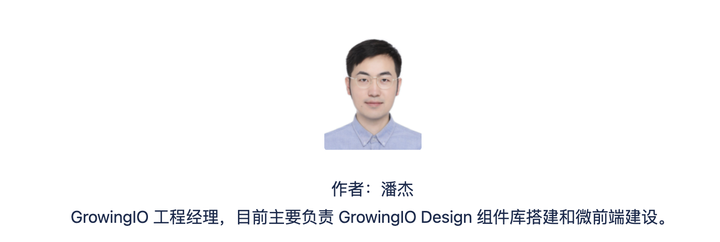前言
在《GrowingIO SaaS 产品 CI/CD 实践》一文中,介绍了持续集成(Continuous Intergration,简称 CI)、持续交付(Continuous Delivery,简称 CD)和持续部署(Continuous Deployment,简称 CD)三个概念,以及在 GrowingIO SaaS 产品中的实践。
文中还强调一个典型的 CI/CD 流程建设至少需要具备以下功能的工具:
- 代码存储库,即需要版本控制软件来保障代码的可维护性,同时作为构建过程的素材库
- 持续集成服务器,用于自动执行构建,测试,部署等任务
- 集中的制品管理仓库,用于存放构建的成果物,用于部署
- 自动部署工具,用于将构建到的程序自动的部署到目标服务器
对于 GrowingIO Design,使用的工具是: - 代码存储库:GitHub
- 持续集成服务器:GitHub Actions
- 集中的制品管理仓库:npm
- 自动部署工具:Vercel
持续集成
代码检查(Lint codes)
在《GrowingIO Design 组件库搭建之开发工具》一文中,介绍了组件库使用 stylelint 和 ESLint 作为代码规范工具。
为了方便使用,在 package.json 文件中增加一下两个脚本(后文简称脚本化):
{
"scripts": {
"eslint": "eslint src --ext .ts,.tsx",
"stylelint": "stylelint 'src/**/*.{css,less}' --syntax less",
},
} 然后用 GitHub Actions 来执行这两个命令:
jobs:
lint:
name: Lint codes
needs: install
runs-on: ubuntu-latest
steps:
- name: Checkout repository
uses: actions/checkout@v2
with:
ref: ${{ github.event.pull_request.head.sha }}
- name: Setup Node.js
uses: actions/setup-node@v2.4.1
with:
node-version: 14
- name: Restore Node.js modules
uses: actions/cache@v2.1.6
with:
path: node_modules
key: ${{ runner.os }}-${{ hashFiles('yarn.lock') }}
- name: StyleLint
run: yarn stylelint
- name: ESLint
run: yarn eslint 单元测试(Unit test)
《GrowingIO Design 组件库搭建之单元测试》中提到单元测试工具主要使用 Jest,在 CI 流程中除了保证单元测试通过,还要统计测试覆盖情况(通过 --coverage 参数来实现)。
命令脚本化:
{
"scripts": {
"test": "jest",
},
} GitHub Actions 中的 job:
jobs:
unit_test:
name: Unit test
needs: install
runs-on: ubuntu-latest
steps:
- name: Checkout repository
uses: actions/checkout@v2
with:
ref: ${{ github.event.pull_request.head.sha }}
- name: Setup Node.js
uses: actions/setup-node@v2.4.1
with:
node-version: 14
- name: Restore Node.js modules
uses: actions/cache@v2.1.6
with:
path: node_modules
key: ${{ runner.os }}-${{ hashFiles('yarn.lock') }}
- name: Cache test report
id: cache-test-report
uses: actions/cache@v2.1.6
with:
path: coverage/lcov.info
key: test-report-${{ github.event.pull_request.head.sha }}
- name: Test
if: steps.cache-test-report.outputs.cache-hit != 'true'
run: yarn test --coverage 打包(Build package)
组件库打包使用 father-build 工具,主要看重它的三个特性:
- 基于 rollup 和 babel 的组件打包功能
- 支持 TypeScript
- 支持 cjs、esm 和 umd 三种格式的打包
三种格式打包对应的目录为:
打包命令脚本化:
{
"scripts": {
"build": "father-build",
},
}
GitHub Actions 中的 job:
jobs:
build:
name: Build package
needs: install
runs-on: ubuntu-latest
steps:
- name: Checkout repository
uses: actions/checkout@v2
with:
ref: ${{ github.event.pull_request.head.sha }}
- name: Setup Node.js
uses: actions/setup-node@v2.4.1
with:
node-version: 14
- name: Restore Node.js modules
uses: actions/cache@v2.1.6
with:
path: node_modules
key: ${{ runner.os }}-${{ hashFiles('yarn.lock') }}
- name: Cache package
id: cache-package
uses: actions/cache@v2.1.6
with:
path: |
dist
es
lib
key: package-${{ github.event.pull_request.head.sha }}
- name: Build
if: steps.cache-package.outputs.cache-hit != 'true'
run: yarn build 代码质量(Sonar scan)
使用 Sonar 来检测代码质量,并且用来展示单元测试报告。
GitHub Actions 中的 job:
jobs:
sonar:
name: Sonar scan
needs: unit_test
runs-on: ubuntu-latest
steps:
- name: Checkout repository
uses: actions/checkout@v2
with:
fetch-depth: 0
ref: ${{ github.event.pull_request.head.sha }}
- name: Restore test report
uses: actions/cache@v2.1.6
with:
path: coverage/lcov.info
key: test-report-${{ github.event.pull_request.head.sha }}
- name: Upload reports to SonarCloud
uses: sonarsource/sonarcloud-github-action@master
env:
GITHUB_TOKEN: ${{ secrets.GITHUB_TOKEN }}
SONAR_TOKEN: ${{ secrets.SONAR_TOKEN }} 这个 job 会把代码扫描结果和覆盖测试报告上传到 sonar cloud,并把结果反馈在 PR 上:
持续交付
有了持续集成流程后,持续交付流程就比较简单了。因为对于 GrowingIO Design 来说,交付产物是 npm 包,对应的命令就是:
$ yarn build
$ yarn publishGitHub Actions 的 job:
jobs:
publish-package:
if: ${{ startsWith(github.event.head_commit.message, 'docs(release)') }}
name: Publish package
runs-on: ubuntu-latest
steps:
- name: Checkout
uses: actions/checkout@v2
- name: Setup Node.js
uses: actions/setup-node@v2.4.1
with:
node-version: 14
registry-url: 'https://registry.npmjs.org'
- name: Cache Node.js modules
id: cache-node-modules
uses: actions/cache@v2.1.6
with:
path: node_modules
key: ${{ runner.os }}-${{ hashFiles('yarn.lock') }}
- name: Install
if: steps.cache-node-modules.outputs.cache-hit != 'true'
run: yarn install
- name: Build
run: yarn build
- name: Publish package
run: yarn publish --non-interactive --access public
env:
NODE_AUTH_TOKEN: ${{ secrets.NPM_TOKEN }}
- name: Get package version
id: get-package-version
run: echo "::set-output name=version::$(yarn -s get-version)"
- name: Publish GitHub release
uses: actions/create-release@v1
env:
GITHUB_TOKEN: ${{ secrets.GITHUB_TOKEN }}
with:
tag_name: v${{ steps.get-package-version.outputs.version }}
release_name: v${{ steps.get-package-version.outputs.version }}
body_path: VERSION.md
draft: false
prerelease: false 额外说一下,在发布包之后,我们还想把当前版本的 changelog 发布到 GitHub 的 release 中,我们约定先提交一个用于发版的 Pull Request,例如:
当这个 Pull Request 被合并后,就会触发持续交付流程,这也是有以下判断条件的原因:
if: ${{ startsWith(github.event.head_commit.message, 'docs(release)') }}
当 job 执行完后,会在 GitHub 上创建对应的 release:
其他流程
依赖包更新
这里使用 GitHub Dependabot 自动维护仓库的依赖项。Dependabot 确定依赖项是否有新版本,它通过查看依赖的语义版本 (semver) 来决定是否应更新该版本。当 Dependabot 发现过时的依赖项时,它会发起 Pull Request 以将清单更新到依赖项的最新版本。检查测试是否通过,查看 Pull Request 摘要中包含的更改日志和发行说明,然后合并它。
dependabot 的配置:
version: 2
updates:
- package-ecosystem: 'npm'
directory: '/'
schedule:
interval: 'weekly'
ignore:
- dependency-name: '*'
update-types: ['version-update:semver-patch']
- dependency-name: '@storybook/*'
- package-ecosystem: 'github-actions'
directory: '/'
schedule:
interval: 'monthly' 部署预览网站
在《GrowingIO Design 组件库搭建之组件开发》文章中提到组件文档使用 Storybook 来生成网站,为了实现每个 Pull Request 能单独部署生成预览网站,调研了一些产品,最终筛选出三个 Netlify、Vercel 和 Surge,以下是这个三个产品的特性对比:
对于 Netlify,每个 Pull Request 提交频率会比较频繁,300 分钟的额度会很快被用完,所以 Netlify 也不适合在此使用。
对于 Surge,一开始想通过 GitHub Actions 把网站部署到 Surge,但是遇到一个问题,Surge 网站的 token 只能存放在仓库的 secrets 中,GitHub 禁止从 fork 仓库提交的 Pull Request 访问 secrets,GitHub 上的原话是:
Secrets are not passed to workflows that are triggered by a pull request from a fork.
我们只能另辟蹊径,使用 Azure DevOps,它是通过环境变量来存储 token,但是不会像 GitHub 对 fork 仓库的 Pull Request 有限制。参考 Netlify 的实现,把部署的 URL 通过评论的形式添加到 Pull Request 上。
对于 Vercel,对 GitHub 上的组织账号是收费,但是对于开源项目可以申请 Open Source 的 License,我们用 GrowingIO Design 申请了 License 后,最终使用 Vercel 来托管预览网站。
总结
通过 CI/CD 流程把组件库搭建的前序工作都串联起来了,基础设施已搭建完成,接下来主要工作就是丰富组件了。
GrowingIO Design 组件库搭建系列文章只是告一段落,但并不是结束。接下来还会一些复杂组件实现的文章,或者相关工具库的实现。随着时间推移和技术迭代,未来甚至可能会推到现有基础设施,重新构建。敬请期待!
参考文献
- *GrowingIO SaaS 产品 CI/CD 实践 (一):https://mp.weixin.qq.com/s/4F...
- GrowingIO Design 组件库搭建之开发工具:https://mp.weixin.qq.com/s/rd...
- GrowingIO Design 组件库搭建之单元测:https://mp.weixin.qq.com/s/BP...
- GrowingIO Design 组件库搭建之组件开发:https://mp.weixin.qq.com/s/Ey...
- GitHub Actions:https://docs.github.com/en/ac...
- Depandabot:https://docs.github.com/cn/gi...
- 语义版本:https://semver.org/ *










**粗体** _斜体_ [链接](http://example.com) `代码` - 列表 > 引用。你还可以使用@来通知其他用户。